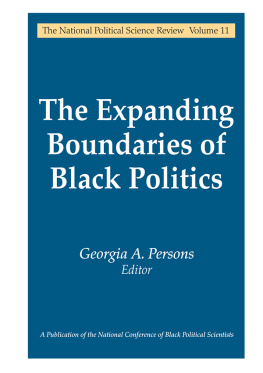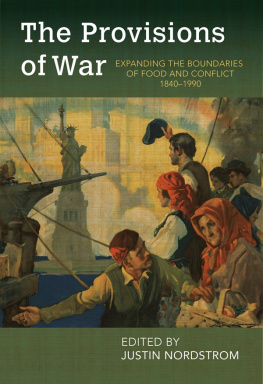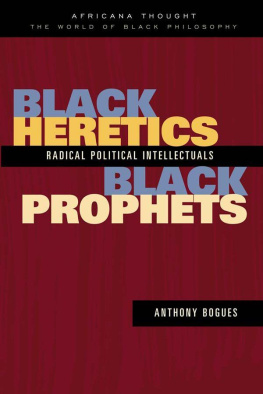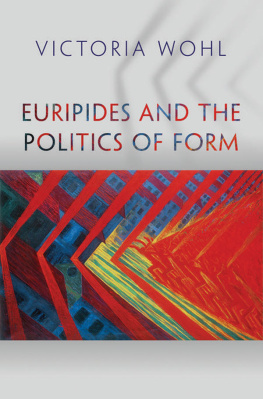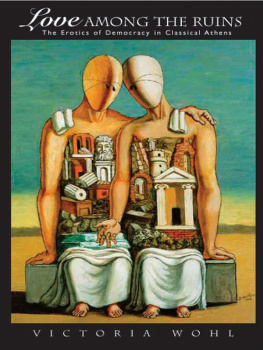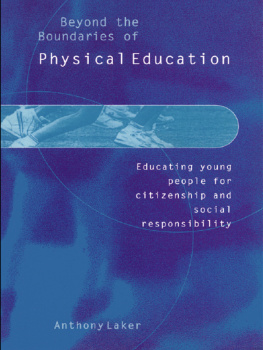The National Political Science Review Volume 11
The Expanding
Boundaries of
Black Politics
Georgia A. Persons
Editor
First published 2007 by Transaction Publishers
Published 2017 by Routledge
2 Park Square, Milton Park, Abingdon, Oxon OX14 4RN
711 Third Avenue, New York, NY 10017, USA
Routledge is an imprint of the Taylor & Francis Group, an informa business
Copyright 2007 by Taylor & Francis.
All rights reserved. No part of this book may be reprinted or reproduced or utilised in any form or by any electronic, mechanical, or other means, now known or hereafter invented, including photocopying and recording, or in any information storage or retrieval system, without permission in writing from the publishers.
Notice:
Product or corporate names may be trademarks or registered trademarks, and are used only for identification and explanation without intent to infringe.
Library of Congress Catalog Number: 2006103024
Library of Congress Cataloging-in-Publication Data
The expanding boundaries of Black politics / Georgia A. Persons, editor.
p. cm.(The national political science review ; v. 11)
Includes bibliographical references and index.
ISBN-13: 978-0-7658-0375-7
1. African AmericansPolitics and government20th centuryCongresses. 2. African AmericansPolitics and government21st centuryCongresses. 3. Political participationUnited StatesCongresses. 4. ElectionsUnited StatesCongresses. 5. African AmericansSocial conditions1975Congresses. 6. United StatesRace relationsPolitical aspectsCongresses. 7. United StatesRace relationsPolitical aspectsHistory20th centuryCongresses. I. Persons, Georgia Anne. II. National political science review.
E185.615.E93 2007
324.08996073dc22
2006103024
ISBN 13: 978-0-7658-03757 (pbk)
THE NATIONAL POLITICAL SCIENCE REVIEW
EDITOR
Georgia A. Persons
Georgia Institute of Technology
ASSOCIATE EDITORS
Robert C. Smith
San Francisco State University
Cheryl M. Miller
University of Maryland-Baltimore County
EDITORIAL BOARD
Nolan Jones
National Governors Association
Hanes Walton
University of Michigan
Charles Hamilton
Columbia University
Lenneal Henderson
University of Baltimore
Mack Jones
Clark Atlanta University
Melissa Nobles
Massachusetts Institute of Technology
Cathy J. Cohen
University of Chicago
Susan Carroll
Rutgers University
Susan MacManus
University of South Florida
David Covin
Sacramento State
William Nelson
Ohio State University
Lorenzo Morris
Howard University
Richard Iton
Northwestern University
Charles E. Jones
Georgia State University
Michael Preston
University of Southern California
Marion Orr
Brown University
Joseph Stewart, Jr.
University of New Mexico
K. C. Morrison
University of Missouri Columbia
Robert Wineburg
University of North Carolina Charlotte
The Editor offers special thanks to all of the contributors featured in this volume of the National Political Science Review. Special thanks to Todd Shaw, Symposium Editor, for his outstanding efforts in organizing the collection of papers around which this volume is anchored. Thanks also to Associate Editors Robert C. Smith and Cheryl M. Miller, and colleagues in the discipline who served as reviewers and made completion of this volume possible.
Thanks to Melissa Nobles, President of NCOBPS and Kathy Stromile-Golden, Executive Director of NCOBPS for their support and assistance with the business and financial aspects of managing the journal. I would also like to extend deep appreciation to Matthew Holden, former Editor of the National Political Science Review for his ongoing support and assistance in raising the profile of the journal.
Thanks to the copy editors at Transaction Publishers for providing outstanding technical assistance and for ensuring that the journal meets the highest standards of quality and accuracy. Carmen Williams and Katara Jones of the School of Public Policy, Georgia Institute of Technology, have provided administrative assistance, kindness, mirth and good humor in support of the ongoing logistical needs of the journal.
The National Political Science Review is currently indexed in the following publications: American History & Life, Historical Abstracts, International Index to Black Periodicals, International Political Science Abstracts, Social Planning-Policy & Development Abstracts, Sage Race Relations Abstracts, Social Science Abstracts, and Sociological Abstracts.
Thanks to all of the contributors and reviewers over the years, editorial board members past and present, and members of NCOBPS. Because of your support, The National Political Science Review has been established and sustained as a nationally and internationally respected peer-reviewed journal and a leader in the field of African American Politics.
One of the challenges to political science research and scholarship as pursued outside of highly resourced and privileged environments of think-tanks is the inability of scholars to rapidly shift foci to produce substantive analyses of newly breaking debates on societal problems. The result is that there is usually a considerable lag time between breaking news issues which dominate public debate and discourse and political science analyses of these issues. There are several reasons for this state of affairs. One is the resource constraint. Most of us do not have the benefit of an extensive team of well trained research assistants. Nor are we exempt from the multifaceted demands of teaching. Thirdly, scholarship is ultimately about knowing and understanding, ends which require a level of deeply engaged and sustained inquiry. Indeed, much of what scholars do is to attend to the maintenance needs of their disciplines. We busy ourselves with filling in the conceptual, theoretical and analytical gaps in the knowledge base. It is our critical duty as scholars to do so. Moreover, the customs, traditions, and rewards of the academy strongly dictate that individuals become experts in some specific area, a goal which requires much concentration, dedication and time.
The end result of the convergence of these factors is that sometimes it very much appears that the world of politically significant and compelling societal developments evolves at a rapid-fire pace in comparison to the production of political science analyses of those issues which scholars decide are interesting. Such is the nature of the present moment in history. One readily observes that the oral discourse among political scientists, especially that community of scholars which is loosely organized around concerns about race, gender, social inequality and social justicea significant portion of whom are served by this journalis rife with concerns such as the dire social conditions exposed by Hurricane Katrina; the mass-scale failure of public organizations which accompanied Hurricane Katrina; the injustices associated with the war in Iraq; the alarming marginalization of African American males and the attendant risks to all of Black America; the persistent failure of Americas public schools which disproportionately serves African Americans; the heated debate and policy stalemate over immigration reform; the absence of a mobilizing ethos within the black community with the potential for generating and sustaining a meaningful policy agenda. These are the kind of compelling issues which comprise the oral discourse among black political scientists. However, our scholarly productivity woefully lags behind and only partially addresses our political concerns and interests.


